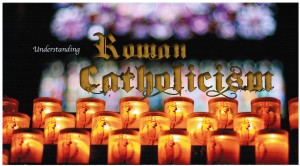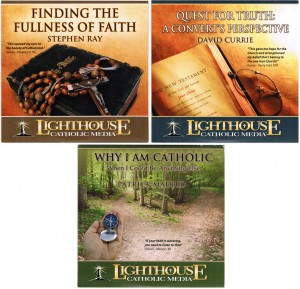The 3rd and final week of Pastor Vince’s series “Understanding Roman Catholicism” was this past Palm Sunday. I debated whether or not to even write anything up about it because his claims are just so outrageous. He’s already proven in the first 2 weeks (week 1 here – week 2 here) that he is more inclined to anti-intellectual, anti-Catholic rhetoric than he is to actually investigating and pursuing true differences between Catholicism and Protestantism. If you’re wondering if such an investigation is even possible to do in a gentlemanly fashion, the answer is yes; quite so. A while back, I wrote about the group Evangelicals and Catholics Together (ECT) and posted links to their documents. Pastor Vince (PV from here on out) would do well to read up on some actual Protestant scholarship. This critique of PV’s “sermon” will be much more brief as I’m thinking it not worthwhile to do a point-by-point of each and every error. There are just too many to even count. Instead I’ll just respond to a few points I scribbled down as I listened.
PV set up his unmentioned conclusion in earlier weeks. Catholics don’t know the Bible. If only they did, they’d realize just how easily their doctrines are disproved. To that, I’d simply respond that the Church doctors, teachers, theologians, and great Saints who advanced and deepened Catholic theology over the years knew the Bible better than most of us could ever dream. Before just writing them off, one would be wise to at least read what a Catholic intellectual would have to say. To all of his biblical quotes where he supposedly disproves Catholicism, the Catholic response is, “yeah – so what. That doesn’t prove the point you’re trying to make.” The Bible has led more people into the Church than out of it.
Since I’m not going to address each and every issue, let me just say that if a protestant who stumbles across this series of posts truly wishes to delve deeper, feel free to contact me. There are responses to each issue. I’ve shown in the previous weeks that PV’s claims are not credible. I’ve shown that Catholicism is credible. To validate that claim – go back and read those posts (links above).
I’ll transcribe PV’s quotes in blue (these quotes are not exact – I scribbled down some notes on my commute; red lights only – not while driving) followed by my responses.
[podcast]http://ben.cleansingfire.org/audio/pv_damned_to_hell.mp3[/podcast]
PV: The Roman Catholic Church has condemned me to hell and condemned every member of LCC to hell.
youch! That’s quite the claim. This is perhaps the most important message to get across to PV and his flock, “the Church condemns no one to hell”. That would be grossly overstepping her bounds. In fact, we affirm that Evangelicals are our brothers and sisters in Christ.
and another:
[podcast]http://ben.cleansingfire.org/audio/pv_make_the_call.mp3[/podcast]
I’m sure LCC’s staff are incredible people. I’d love to talk with any of you (including PV). However, this presentation by PV is anything but objective. It’s pretty clear also that it is intellectually dishonest.
PV: anathema is the equivalent of damning someone to hell.
http://www.catholic.com/thisrock/2000/0004chap.asp
PV: Roman Catholicism is a cancer
Nice – real nice 🙂
PV: popery started with Gregory
http://socrates58.blogspot.com/2009/06/antidote-to-john-calvins-institutes_25.html
http://socrates58.blogspot.com/2005/06/i-love-word-popish-steve-hays-and.html
PV: the Protestant response is…
PV says this multiple times throughout this session. #1 there is no one protestant response. #2 if you were to weld together all of the various protestant responses into one, it would sound much different that PV’s response.
PV: Catholics “need” Mary
hmmm – not really anymore than protestants would. How exactly did Jesus get here?
PV: If there’s one chapter in one book I’d like to destroy it’s 2 Maccabees 15 because there’s so much damnable content
Father, forgive him for he knows not what he says.
PV: He uses a pretty nasty voice when quoting a Catholic who said “there’s only one Cathechism”
I thought he wasn’t going to do any Catholic bashing. Sure, whoever said that was wrong. So what? We all make errors. And supposing this person was a jerk to him – that’s just one person. I know of at least a few people (myself included) who have sent very polite emails and received no response. But he choose to caricature us Catholics as whiny dimwits. Thanks, PV!
PV: merit means earned
He’s leaving out a major distinction between condign merit and congruent merit. From wikipedia:
Condign merit (meritum de condigno) is an aspect of Roman Catholic theology signifying a goodness that has bestowed because of the actions of that person. In opposition is congruent merit, a goodness bestowed on a person because of someone else, typically God.
PV: earn what Christ has earned – very complex idea
Actually it’s not that complex. I’ll be honest in that I find the justification debate somewhat lame. The only issue I had w/ it when becoming Catholic was that I didn’t want it to be true. I had no issue believing intellectually that works are necessary. I didn’t want to believe it because that meant I had to change some things in my life. The best explanation I’ve heard is that both faith and works are responses to God’s grace. Neither are our own doing. Both kinds of faith and works required for salvation require God’s graces. The tired Protestant expression that “Catholics work their way to heaven” is just flat wrong. Catholics believe that man is required to respond to God’s grace by allowing Him to change our lives and turn away from sin is a much better way to put it.
PV: Catholics have no idea if a baby who dies w/out baptism goes to heaven. That child is at the mercy of God.
I didn’t hear PV say what was wrong about this. He must believe 1) the child is damned, 2) the child is saved, or 3) we don’t know if the child is saved or damned. I don’t believe he stated his position or if he gave any reason for his position.
PV: The rosary is 10 prayers to Mary for every one to God.
hmmm – he totally skips the most important part of the Rosary – the meditations on the life of Christ. Perhaps others understand it differently, but I’ll share my experience having gone from having never prayed the rosary to trying to pray it frequently. To me, rote pray (saying “Hail Mary, full of grace…” over and over again) is not an end, but a means to meditation. All the externals of Catholicism are meant to effect our constant interior conversion to Christ. If the externals are not doing that, then I’ll grant PV that they are all for naught. However, as someone who was mostly turned off by such externals most of my life (even after my initial conversion to Catholicism), I have become more and more astonished by the kind of effect these externals have on my interior life. This was especially surprising to me after my first few TLM experiences. The TLM was somewhat repulsive, yet so enticing. Afterwards, I felt like I understood the mysteries of Christ much more than I did before.
PV: Catholics believe that they can be saved by someone else
No – ultimately our salvation is up to us. Everyone either chooses heaven or chooses hell. Certainly other people help us make that choice; in some ways direct and other ways indirect. I’m sure PV wouldn’t disagree w/ that. He’s using bad logic. How would PV even know about Jesus Christ unless someone told him? Would his salvation not be dependent on that other person? Is that person not in some sense his savior?
PV: Catholic soteriology is based on obeying the law
Yes, there is legitimate disagreement among Catholics and Protestants about the involvement of good works in regard to our salvation. However, Catholic theology has never excluded the fact that God wants our hearts. He desires an intimate relationship with us. In fact, he knows us better than we know ourselves. We get to heaven by responding to his grace. PV’s description of the Catholic understanding of salvation is completely lacking in this dimension. This is another case of the Catholic both-and (as opposed to either-or; either faith or works in this case).
PV: Mary had brothers
http://www.catholic.com/library/Brethren_of_the_Lord.asp
http://www.catholic.com/library/Mary_Ever_Virgin.asp
PV: Mary w/out sin means she had no need of a savior
PV once again misrepresents the Catholic position. Mary needed Jesus for her salvation just like everyone else. What’s different is that Jesus saved her earlier in that she was able to lead a sinless life. I don’t remember where I head this analogy, but I’ll retell it the best I remember:
Human sin is like a tar pit which we can’t free ourselves from. We require a savior to reach down and pull us out of it. In Mary’s case, this savior kept her from falling into the pit in the first place. Without the assistance of the savior, she would’ve have fallen in just like everyone else.
PV: purgatory
The best response to a protestant I can mount about the existence of purgatory is, “CS Lewis believed in it”.
http://socrates58.blogspot.com/2010/06/c-s-lewis-belief-in-purgatory-and.html
I heard a scholar talking about Lewis (one of my favorite authors) on a radio program once. The host prodded with a question like, “do you think if Lewis had lived another 10 years he would’ve eventually become a Catholic?” The response was something like, “yes, but I don’t believe that was in God’s plan. I believe God purposely kept Lewis outside the Church. If he had entered, then he wouldn’t have become the giant of Protestant thought that he is today. They would write him off as one of those Catholic writers (much like Newman). Instead, by remaining an Anglican, he serves as a splendid bridge legitimizing so many Catholic beliefs into the Protestant mind.”
Resources:
3 books that probably had the most profound effect on my eventual conversion:
Catholicism and Fundamentalism
The Salvation Controversy
Rome Sweet Home
And as always – be sure to recommend 1460 AM to one and all.
If you happen to encounter anyone with such anti-Catholic beliefs, be sure to be gentle. If they’re really open to hearing the Catholic point of view, there are plenty of resources that you can give them. If they aren’t open, then nothing you can say will convert them. Ultimately it’s all up to the Holy Spirit (but that doesn’t get us off the hook of doing our part).
The whole session is here:
[podcast]http://lakeshorechurch.org/musiclibrary/fileman/podcast/sunday/183/183-848.mp3[/podcast]





